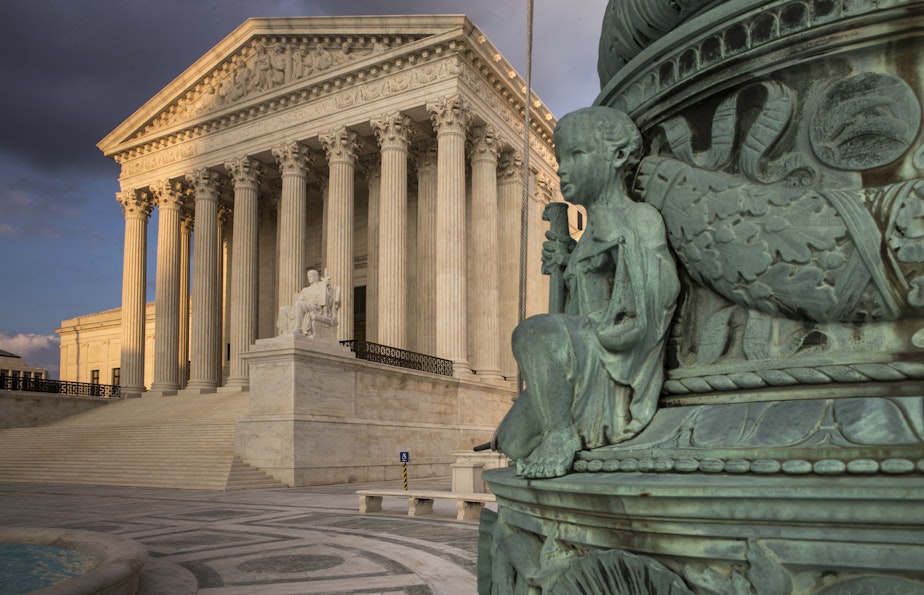Retired nurse remembers how 'everything changed' after Roe v. Wade

Suzy Palmer's heart still breaks when she thinks of some of the patients she cared for as a pediatric nurse.
She began her career as an advanced practice nurse in Chicago before the landmark U.S. Supreme Court decision in Roe v. Wade. It was there that she saw how "desperation" damaged lives — both of her pregnant patients and their children.
"I'm very well-aware of the price that young women pay for having illegal abortions and not having the right to have them done in the hospital by a medical professional," Palmer said. "And the children that are born when they are not wanted and not received in to a healthy family situation. We're medically risking lives."
In the coming weeks, the U.S. Supreme Court is expected to strike down Roe v. Wade, which has protected the right to abortion for the last five decades.
A draft opinion reversing course was leaked last month.
After reading the leaked draft opinion, Palmer said she felt compelled to speak out.
She recalled one woman she cared for in the years before Roe.
Sponsored
"I was in the delivery room with a mom in the process of delivering a little baby and, tears in her eyes, begging the doctor to tell her husband that the baby was stillborn," Palmer said. "Because she had six children at home. ... And there's no safety net when those things happen."
Palmer said she knew doctors, including the man delivering that baby, who wanted to help — whatever that meant in each case — but at a time when abortion was illegal, his hands were tied. He could not lie to the woman's husband. So, he promised to get her help, and the baby was born.
"If you ask me, am I pro or against abortion, I'm not either, which sounds like a Pollyanna-ish answer," Palmer said. "I believe that depending on the situation, the child and the family has the right to make that decision together. It's not my business."
In fact, Palmer said she was raised to be a conservative, ideologically against abortion.
She said she has helped numerous young people who chose not to have an abortion.
Sponsored
For years, Palmer and her husband, who now live on Whidbey Island, have opened up their home to pregnant teenagers who want to have their babies but put them up for adoption.
She said most are high school girls who, for whatever reason, cannot stay in their own homes once they make the decision.
She started when she was a confidante to her own children's babysitter.
"I still hear from her," she said. "You have to understand that they are doing this because they want to change things in their lives. And I don't want to be a member of a community that doesn't care. Somebody has to care."
Sponsored
The rate of abortions has been on the decline for the last 30 years, according to the Guttmacher Institute's latest Abortion Provider Census. But those numbers have started rising again in recent years, with abortions up almost 8% from 2017 to 2020.
According to the the Abortion Provider Census, the most comprehensive data on abortions in the U.S., one in five pregnancies ended in abortion in 2020. The majority of people who utilize abortion services are low income.
Palmer, who is also a child advocate, knows what the stigma surrounding teenage parents, in particular, can drive young people to do if abortion services are not available or legal.
In Chicago, she said Black women were especially affected, left with lesser access to health care in general when compared to their white peers.
"Oftentimes, you had an African American woman who couldn't get the help she needed, and so, out of desperation, she would go to a neighbor or do it herself," Palmer said. "And there were terrible consequences. Women would bleed out. The worst was when the babies were born, and they were viable and they were left to die."
Sponsored
Now, as the end of Roe likely nears, Palmer said she fears these stories will return again, even though states like Washington will continue to allow access to abortion and abortion-related services.
"My number-one concern is women's health. If you start restricting the right to have a safe and medical abortion, we're eliminating the chance to prevent problems afterwards, either with the mom or the baby," she said. "That was one of the biggest things that I think came out of Roe v. Wade is that we finally had a place for women to get proper counseling and emotional support."
Palmer said she hopes the Supreme Court's reversal on Roe, which is not yet official, will be an opportunity for the nation to improve prenatal and pediatric care, no matter what parents choose for their families.
"And I know there are people who agree with me," she said. "The question is: What can we do? What can we do to make it better?"





